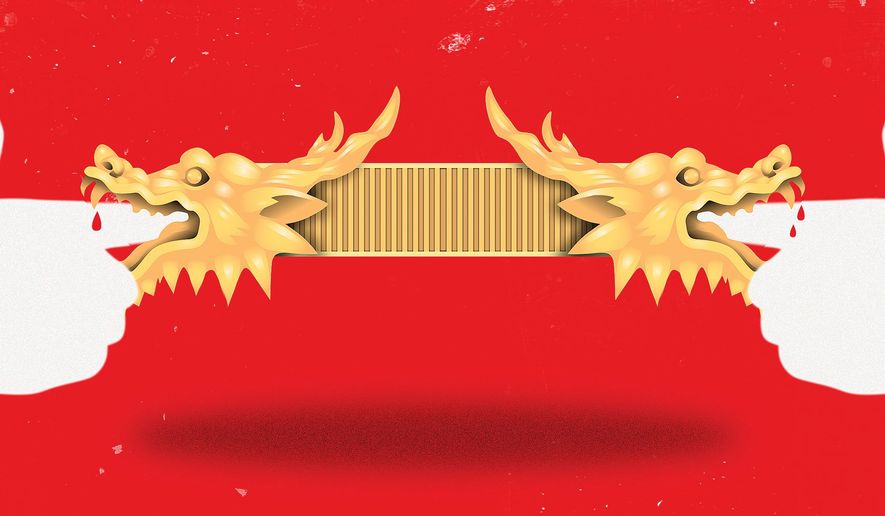OPINION:
President Trump’s decision to yet again negotiate with China, instead of imposing across the board tariffs, will empower his critics and undermine American prosperity.
The White House reported that Mr. Trump emerged from his Dec. 1 meeting in Buenos Aires with President Xi with an agreement to discuss reforms in China’s nontariff barriers, requirements that U.S. subsidiaries in China transfer technology and state-enabled intellectual property theft and cyber espionage.
That is hardly a full list of American grievances — others include its high tariffs, export subsidies, requirements that U.S. multinationals take domestic joint-venture partners to sell in China, arbitrary treatment of U.S. investors by Chinese courts and regulators, and Beijing’s 2025 Program to achieve global dominance in chip making and software that define artificial intelligence.
The policies enumerated and omitted are so mutually reinforcing in the tyranny they impose on U.S.-based businesses and workers that all are likely fair game, at least in the minds of U.S. negotiators.
True to form, Chinese officials emerged from the Dec. 1 meeting refusing to admit accepting the U.S. agenda and characterized the agreement as focusing on eliminating the limited recently imposed U.S. tariffs in exchange for beefing up purchases of U.S. agricultural products and energy.
Mr. Trump’s decision to suspend broader tariffs — advocated by doves on his trade team — simply continues the Bush-Obama policy of appeasement veiled in endless bilateral talk.
China’s mercantilist policies, espionage and felonious private behavior are so embedded in the culture of its authoritarian, socialist government and private sector that any agreement reached by the March 1 deadline will have little more significant impact on bilateral commercial relations than to reinstate pork and soybean exports and increase natural gas sales—products that geography requires China import anyway.
Ultimately, the winners will be Beijing and large U.S. multinationals, like Google and GM, which are so intoxicated with penetrating China’s large markets that they abandon national loyalty. And Wall Street financial houses, who arrange for the financing that outsources American jobs and recycles the dollars that China steals through its bilateral trade surplus into ownership of American businesses, real estate and securities.
Those decadent interests are effectively represented in the Trump administration by Goldman Sachs alumni and Treasury Secretary Steven Mnuchin. It is noteworthy, for example, that he was rewarded by President Xi for brokering the Buenos Aires armistice with concessions loosening restrictions on the activities of U.S. bank in China. Those will further both Beijing’s and Wall Street’s agendas to move U.S. factories to the Middle Kingdom and do nothing to alleviate American complaints about China’s high-tech kleptocrarcy.
It is important to recognize Mr. Trump is negotiating with a repressive criminal regime. Beijing persecutes its Muslim and Buddhist minorities, harvests prisoners’ organs for transplant, tightly controls internet content, and monitors the actions and thoughts of its citizens to compel ideological purity and robotic behavior.
Those should elicit cries of outrage and support for more substantive American policies punishing Chinese violations of human rights and international commitments from activists like Rep.-elect Alexandria Ocasio-Cortez and congressional Democrats generally. However, either they are too enamored with socialism or bent on replicating Beijing’s techniques for imposing their brand of politically correct behavior on American society.
It all smells of decay, and Beijing believes it has time on its side. The midterm shellacking Republicans took after Mr. Trump campaigned so vigorously on their behalf likely confirmed in Mr. Xi’s mind that the president will soon be a lame duck and just needs to be slow-walked a bit longer.
Then Mr. Xi can then deal with Democratic president hopefuls like Sen. Elizabeth Warren or Sen. Corey Booker who believe free market capitalism is a sham and basic constitutional rights expendable as necessary to accomplish their social agendas. After all, they would make good acolytes to administer Mr. Xi’s American vassal state.
Campaigning for office, Mr. Trump promised to slap a 25 percent across the board tariff on all Chinese imports and do whatever else was necessary to redress bilateral commercial relations.
At Mar-a-Largo in April 2017, Mr. Xi coaxed him into a round of bilateral talks that resulted in little progress — an approach that has failed presidents going back to Bill Clinton. And in Buenos Aires, Mr. Trump took the bait again.
Historians will take the president’s measure and on trade, it may find him lacking.
• Peter Morici is an economist and business professor at the University of Maryland, and a national columnist.




Please read our comment policy before commenting.